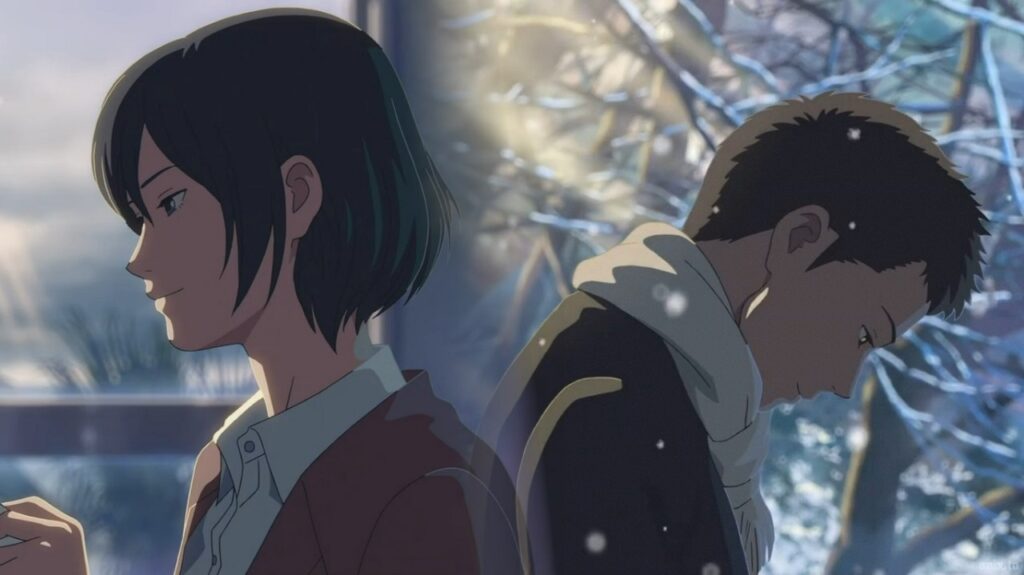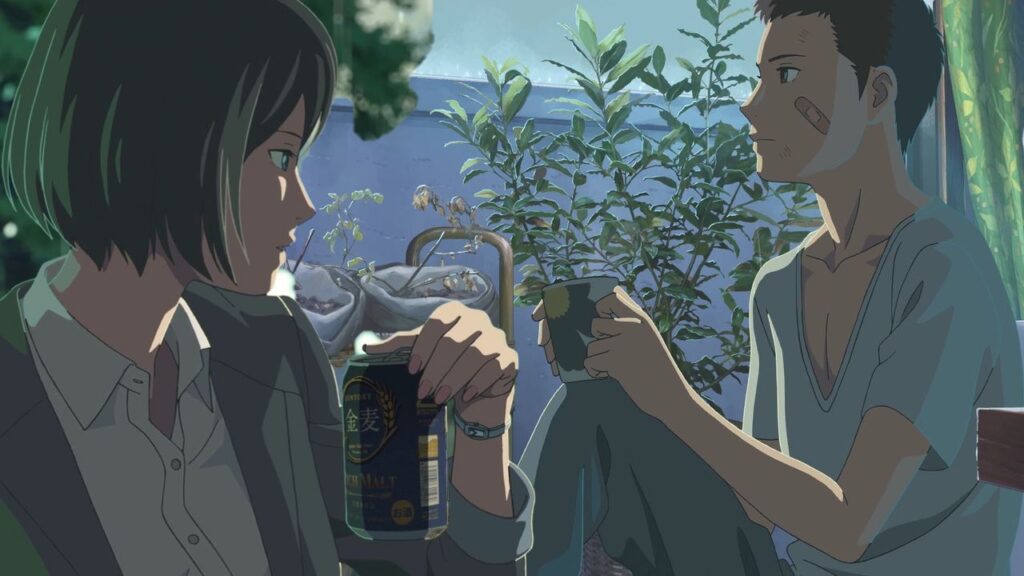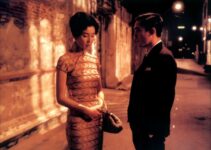This post includes a brief plot summary, an analysis, a review, and an explanation about the ending of the film Kotonoha no Niwa / The Garden of Words (2013). Beware of spoilers.
In a world where connections are often fleeting and superficial, two strangers find solace in each other’s company during rainy mornings in a Tokyo garden. Makoto Shinkai’s “The Garden of Words” explores the relationship between a teenage boy and an adult woman, whose unlikely bond changes both their lives.
The 2013 Japanese anime stars Miyu Irino as Takao Akizuki and Kana Hanazawa as Yukari Yukino.
“The Garden of Words” tells the story of two individuals who decide to escape their routine and seek refuge at a local park.
Takao, a teenage boy, sees a beautiful woman, Yukari, sitting alone at a bench, so he decides to join her. He notices her “love” for beer and chocolate, and she recognizes the crest of his uniform. The two don’t say much to each other. Nevertheless, whenever there is rain, there is a high likelihood for them to meet again in the park.
Yukari starts paying more attention to Takao, and she realizes the boy’s interest in shoes. He is working on a pair of female shoes but has no model for them. So, Yukari “volunteers” her feet for his project. Meanwhile, the rainy season ends and the two stop meeting each other.
After summer break, Takao spots Yukari at school and learns her background story from a classmate. Apparently, Yukari used to be a literature teacher at Takao’s school, but a group of students started to spread malicious rumours about her. Unable to cope with the hostile workplace, Yukari quit her job.
Takao confronts the group of instigators trying to seek justice for Yukari, but they end up beating him badly. After the fight, Takao heads to the park and finds Yukari there. Meanwhile, it begins to rain heavily, and the two head to Yukari’s apartment.
During that afternoon, Takao professes his love to Yukari, who reminds him of the reality of things. First, she’s a teacher. Second, the teacher is moving back to her hometown soon. The boy excuses himself and leaves Yukari’s apartment.
Shortly after, Yukari runs after him. At the stairwell, the boy berates Yukari for being secretive and playing with his feelings. The teacher embraces Takao and explains how he actually saved her during their mornings at the park.
The film ends with Takao continuing his studies in Tokyo and Yukari teaching again in her home town. It’s implied that the two are still keeping in touch, as Takao made a pair of shoes, specifically for Yukari.
“The Garden of Words” has a rather reassuring message to its audience: ageing is not the same as growing up, and that is okay.
Before meeting Yukari, Takao had this idea that being an adult was the best because he thought they had it all figured out. However, Yukari proves him the completely opposite. She is older than Takao, but she is just as lost as he is.
The transition to adulthood is an ever-going process. There’s no magic switch. People don’t become adults (mentally) once they hit a certain age. Life happens, and people figure things out as they go.
Having said that, the “world of adults” is a social construct more than anything else. There are many rules trying to dictate what one should do or act like as an adult. However, there is no guide that actually teaches people how to become adults.
Takao stormed out of Yukari’s apartment due to his inability to cope with rejection.
While Yukari didn’t explicitly reject him, she made a responsible choice, as the adult in the room, to not encourage his feelings. Unfortunately, the young boy misinterpreted her actions as indifference.
Nevertheless, Yukari should’ve been more sensitive to Takao’s feelings. When she realized her mistake, Yukari went after Takao to reassure him that his feelings matter. When Takao lashed out on her, he was actually angry at himself for falling in love.
The feeling of rejection leads Takao to blame Yukari for inciting his curiosity with her mysterious nature. However, is he right? Not really. Although Yukari is a very secretive person, she owes him nothing. They are practically strangers.
It’s unfair for Takao to blame it all on Yukari’s beauty and allure. Doing this makes him no better than those jealous girls who were slandering Yukari’s name at school.
Yukari cried at the end because she had been holding in her emotions for too long.
The young woman was hiding her true feelings from everyone, including her ex and her students. Spending time in the park was Yukari’s way of escaping her problems, and meeting Takao was refreshing since he didn’t know her past.
Yukari’s meetings on rainy days with Takao gave her hope and motivation to face life again. For the first time, she saw herself making a breakthrough from her previously poor mental state caused by severe bullying.
The ending of “The Garden of Words” culminates with an emotional farewell where both Takao and Yukari feel hopeful about the future.
After letting it all out, Takao and Yukari part ways. Despite living in different cities, they manage to maintain their friendship through letters. It’s pretty evident that Takao still has feelings for Yukari, otherwise, he wouldn’t have made those shoes for her.
Meanwhile, Yukari seemed to be enjoying her new start in her hometown. And Takao has made some progress on his own too, but there is still a long journey ahead. Nonetheless, the boy is motivated. Takao wants to succeed so he can one day reunite with Yukari as an equal.

The words “walking” and “shoes” have a special significance in “The Garden of Words”.
Walking means living. Meanwhile, shoes are a metaphor for the will to live. In “The Garden of Words”, shoes help a person to walk again (to live again). That mindset was the driving force behind Takao’s desire to make a pair of shoes for Yukari. He wants her to be okay again.
Although Yukari runs after Takao in a weird way (in their last scene), there is nothing physically wrong with the teacher. Her problem is psychological. Yukari tends to run away from her problems instead of confronting them. She could’ve gone after the girls that were bullying her, yet she chose to quit her job.
When the teacher met Takao at the park, she had no direction in life. However, little by little, she started to enjoy life again. Soon, Yukari was once again in charge of her life and making decisions about her future, such as teaching in another city. Having said that, through her interactions with Takao, Yukari learned how to walk again.
Final Thoughts
“The Garden of Words” is a very intimate cinematic experience. Watching the film felt like reading someone else’s personal letters.
As the story unravels, the viewer is basically following two lonely strangers developing a real connection without knowing much about each other. Yukari and Takao don’t know each other’s names up until the moment the teacher shows up at the boy’s school.
Through the characters, Makoto Shinkai explores the complexities of loneliness and the beauty of anonymity. During their meeting at the park, Takao let a stranger know his most intimate secret: the desire to shoemaker. Meanwhile, Yukari showed him a “flawed” adult who skips work to avoid her current life problems.
Overall, “The Garden of Words” is a beautiful film, visually and story-wise. It’s definitely one of those films that lingers in your heart. One can watch over and over again and still find new nuances.




